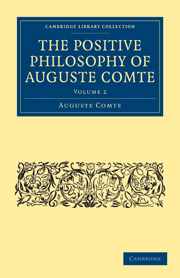Book contents
- Frontmatter
- Contents
- CHAPTER I NECESSITY AND OPPORTUNENESS OF THIS NEW SCIENCE
- CHAPTER II PRINCIPAL PHILOSOPHICAL ATTEMPTS TO CONSTITUTE A SOCIAL SCIENCE
- CHAPTER III CHARACTERISTICS OF THE POSITIVE METHOD IN ITS APPLICATION TO SOCIAL PHENOMENA
- CHAPTER IV RELATION OF SOCIOLOGY TO THE OTHER DEPARTMENTS OF POSITIVE PHILOSOPHY
- CHAPTER V SOCIAL STATICS, OR THEORY OF THE SPONTANEOUS ORDER OF HUMAN SOCIETY
- CHAPTER VI SOCIAL DYNAMICS; OR THEORY OF THE NATURAL PROGRESS OF HUMAN SOCIETY
- CHAPTER VII PREPARATION OF THE HISTORICAL QUESTION.—FIRST THEOLOGICAL PHASE: FETICHISM.—BEGINNING OF THE THEOLOGICAL AND MILITARY SYSTEM
- CHAPTER VIII SECOND PHASE: POLYTHEISM.—DEVELOPMENT OF THE THEOLOGICAL AND MILITARY SYSTEM
- CHAPTER IX AGE OF MONOTHEISM.—MODIFICATION OF THE THEOLOGICAL AND MILITARY SYSTEM
- CHAPTER X METAPHYSICAL STATE, AND CRITICAL PERIOD OF MODERN SOCIETY
- CHAPTER XI RISE OF THE ELEMENTS OF THE POSITIVE STATE.—PREPARATION FOR SOCIAL REORGANIZATION
- CHAPTER XII REVIEW OF THE REVOLUTIONARY CRISIS.—ASCERTAINMENT OF THE FINAL TENDENCY OF MODERN SOCIETY
- CHAPTER XIII FINAL ESTIMATE OF THE POSITIVE METHOD
- CHAPTER XIV ESTIMATE OF THE RESULTS OF POSITIVE DOCTRINE IN ITS PREPARATORY STAGE
- CHAPTER XV ESTIMATE OF THE FINAL ACTION OF THE POSITIVE PHILOSOPHY
CHAPTER XV - ESTIMATE OF THE FINAL ACTION OF THE POSITIVE PHILOSOPHY
Published online by Cambridge University Press: 29 August 2010
- Frontmatter
- Contents
- CHAPTER I NECESSITY AND OPPORTUNENESS OF THIS NEW SCIENCE
- CHAPTER II PRINCIPAL PHILOSOPHICAL ATTEMPTS TO CONSTITUTE A SOCIAL SCIENCE
- CHAPTER III CHARACTERISTICS OF THE POSITIVE METHOD IN ITS APPLICATION TO SOCIAL PHENOMENA
- CHAPTER IV RELATION OF SOCIOLOGY TO THE OTHER DEPARTMENTS OF POSITIVE PHILOSOPHY
- CHAPTER V SOCIAL STATICS, OR THEORY OF THE SPONTANEOUS ORDER OF HUMAN SOCIETY
- CHAPTER VI SOCIAL DYNAMICS; OR THEORY OF THE NATURAL PROGRESS OF HUMAN SOCIETY
- CHAPTER VII PREPARATION OF THE HISTORICAL QUESTION.—FIRST THEOLOGICAL PHASE: FETICHISM.—BEGINNING OF THE THEOLOGICAL AND MILITARY SYSTEM
- CHAPTER VIII SECOND PHASE: POLYTHEISM.—DEVELOPMENT OF THE THEOLOGICAL AND MILITARY SYSTEM
- CHAPTER IX AGE OF MONOTHEISM.—MODIFICATION OF THE THEOLOGICAL AND MILITARY SYSTEM
- CHAPTER X METAPHYSICAL STATE, AND CRITICAL PERIOD OF MODERN SOCIETY
- CHAPTER XI RISE OF THE ELEMENTS OF THE POSITIVE STATE.—PREPARATION FOR SOCIAL REORGANIZATION
- CHAPTER XII REVIEW OF THE REVOLUTIONARY CRISIS.—ASCERTAINMENT OF THE FINAL TENDENCY OF MODERN SOCIETY
- CHAPTER XIII FINAL ESTIMATE OF THE POSITIVE METHOD
- CHAPTER XIV ESTIMATE OF THE RESULTS OF POSITIVE DOCTRINE IN ITS PREPARATORY STAGE
- CHAPTER XV ESTIMATE OF THE FINAL ACTION OF THE POSITIVE PHILOSOPHY
Summary
No preceding revolutions could modify human existence to anything like the degree that will be experienced under the full establishment of the positive philosophy, which we have seen to be the only possible issue from the great crisis which has agitated Europe for half a century past. We have already perceived what must be the political task and character of this philosophy in a rapidly approaching time; and I have only therefore to point out, in a more general way, the natural action of the new philosophical system when it shall have assumed its throne. I will sketch the great impending philosophical regeneration from the four points of view which my readers will at once anticipate;—the scientific, or rather rational; the moral; the political; and finally, the aesthetic.
The scientific action.
The positive state will, in the first place, be one of entire intellectual consistency, such as has never yet existed in an equal degree, among the best organized and most advanced minds. The kind of speculative unity which existed under the polytheistic system, when all human conceptions presented a uniformly religious aspect, was liable to perpetual disturbance from a spontaneous positivity of ideas on individual and familiar matters. In the scholastic period, the nearest approach to harmony was a precarious and incomplete equilibrium: and the present transition involves such contradiction that the highest minds are perpetually subject to three incompatible systems. It is impossible to conceive of the contrasting harmony which must arise from all conceptions being fully positive, without the slightest necessary intermixture of any heterogeneous philosophy.
- Type
- Chapter
- Information
- The Positive Philosophy of Auguste Comte , pp. 549 - 561Publisher: Cambridge University PressPrint publication year: 2009First published in: 1853



